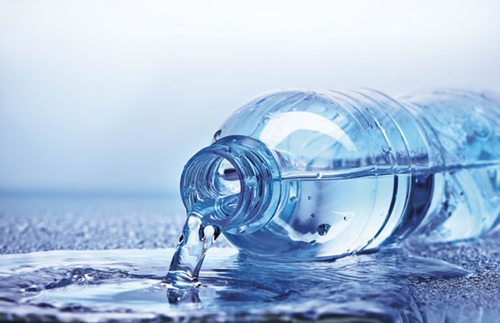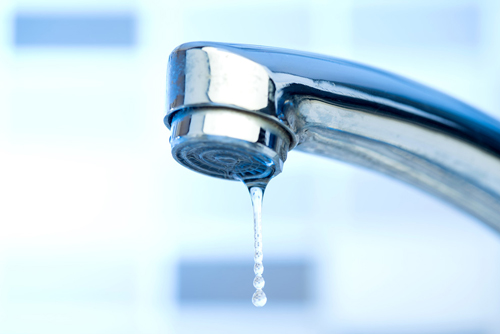Alarming number of toxic chemicals found in tap and bottled water
What could be healthier than following up a good exercise session with a generous amount of cold water – right? Well, the problem is – most people are uninformed about the array of toxic chemicals found inside most brands of bottled (and tap) drinking water.

The frightening truth is: despite the water’s crystalline appearance, it could harbor an invisible cocktail of contaminants. For example, a German study published in the scientific journal PloS One found a shocking 24,500 toxic chemicals in a single bottle of water.
Although the study involved bottled water, tap water can also contain a plethora of toxic chemicals. In fact, depending on where you live, some of them (such as chlorine and fluoride) are virtually guaranteed to be in the water that flows from your kitchen faucet.
Toxic chemicals in drinking water can inhibit hormonal activity by an astounding 90 percent, study says
To conduct the study, the team tested 18 samples of commercial water brands currently sold around the world.
In addition to finding over 24,000 toxins, the researchers discovered that the chemicals mimicked the effects of powerful pharmaceutical drugs. And, some of them greatly interfered with the activity of estrogen and androgen, a pair of sex hormones.
Estrogen regulates the menstrual cycle, and also affects the reproductive tract, brain and cardiovascular system. Androgen, an estrogen precursor, helps to regulate muscle development, erotic drive and the growth of placement of fat cells.
The main culprits in the endocrine disruption, the researchers discovered, were maleates and fumarates – compounds used in the manufacture of plastic resins utilized in water bottles.
Warning: In addition to adversely affecting development and reproduction, these endocrine-disrupting chemicals may also trigger cancer, cardiovascular disease and metabolic disorders – all excellent reasons to avoid them at all costs.
Bombshell: study links fluoride with lowered IQ in boys
A study of over 600 pregnant women (published recently in the well-respected journal JAMA Pediatrics) showed a correlation between consumption of fluoridated water during pregnancy and lowered IQ in male offspring.
The researchers even worked out a formula for assessing the harm. Simply put, the team learned that if a mother’s urinary fluoride levels increased by 1 milligram per liter, her son’s IQ score dropped by 4.5 points.
Dr. Edward Group has long maintained that fluoride is an endocrine disruptor and neurotoxin that can damage the thyroid and pineal glands.
There has been a recent backlash against fluoride – which is customarily added to municipal water in some countries in an attempt to supposedly prevent tooth decay. The chemical has been completely banned in several countries – and over 300 cities and communities across North America have rejected water fluoridation as well.
Having said all of that, experts point out that the results of this groundbreaking study are so compelling that they may lead to changes in public policy.
Chlorine can act as a “double-edged sword” that raises cancer risk
While chlorine can kill dangerous pathogens in drinking water, it can also pose a threat to health. For example, Dr. Group reports that certain organic compounds in water – when combined with chlorine – can create toxins called trihalomethanes.

Exposure to trihalomethanes can cause respiratory concerns and cellular damage – with long-term effects including memory loss and impaired balance. And chlorine has been associated with a variety of cancers, particularly those of the bladder.
In fact, the U.S. Council of Environmental Quality maintains that bladder cancer risk among people drinking chlorinated water is a frightening 93 percent higher than the risk among those whose water does not contain chlorine.
Chlorine can also destroy friendly bacteria in the gut microbiome. Experts say that excessive disruption of this fragile community can lead to obesity, IBS and type 2 diabetes.
Extensive studies have linked lead with lowered IQ in children
Lead (the main toxin involved in the national scandal over unsafe municipal water in Flint, MI) can be released into drinking water through corroded pipes. In addition to causing lowered IQ, lead is toxic to virtually every organ in the body – including the heart and kidneys.
Children are especially vulnerable to lead – with exposure causing stunted growth, behavioral problems, learning disabilities and deafness. Dr. Group notes that there is some evidence that lead exposure is linked to autism.
Health alert: Arsenic and mercury may be present in your drinking water
Most people know that arsenic should not be consumed. To be clear: high doses of this heavy metal can cause abdominal pain, diarrhea, vomiting and even premature death.
But what’s less well known is that chronic, low-level exposure to arsenic can cause cancer of the lungs, bladder and skin. According to Dr. Group, arsenic can enter water through improper waste disposal and poorly-designed wells.
In addition, mercury – which is released as a result of mining and industrial processes – can also make its way into groundwater. This heavy metal is a potent neurotoxin that can cause brain damage, cognitive impairment, memory loss, weakness and tremors.
A legacy of harm: Banned chemicals still persist in our environment
For example, PCBs, or polychlorinated biphenyls, are carcinogens and neurotoxins that have been banned in the United States since 1979. Unfortunately, their slow breakdown rate means that they still exist in landfills – from where they infiltrate the environment.
Disturbingly, PCBs have been found in seawater and snowmelt thousands of miles from their origin. In addition, DDT – a pesticide banned in 1972 – still persists in the environment.
It’s worth noting: The International Agency for Research on Cancer has classified DDT as a carcinogen – and animal studies have shown that it causes reproductive problems and liver damage as well.
Finally, hexachlorobenzene, or HCB, was banned in 1965 – but the toxin can still be formed as a byproduct of other chemicals. Classified as a probable carcinogen by the U.S. Environmental Protection Agency (EPA), HCB claimed over 500 lives in Turkey in the 1950s when it appeared in tainted grain.
By the way, in follow-up studies – 30 years later, researchers found that the breast milk of women in the area still contained up to 150 times the amount of HCB considered permissible!
Reduce toxic exposure with proper filtration
While boiling water may help kill pathogens, Dr. Group notes that it won’t remove chemicals. Your best line of defense is a high-quality, home water purification system.
To further reduce your exposure to toxins, opt for reusable glass bottles over plastic. And, of course, the glass bottles can be reinforced with a rubber sheath to prevent breakage.
Bottom line: It’s ultimately up to us to protect ourselves from the toxic chemicals lurking inside drinking water, with greater awareness – and (above all) an effective water purification system.
yogaesoteric
November 14, 2019
